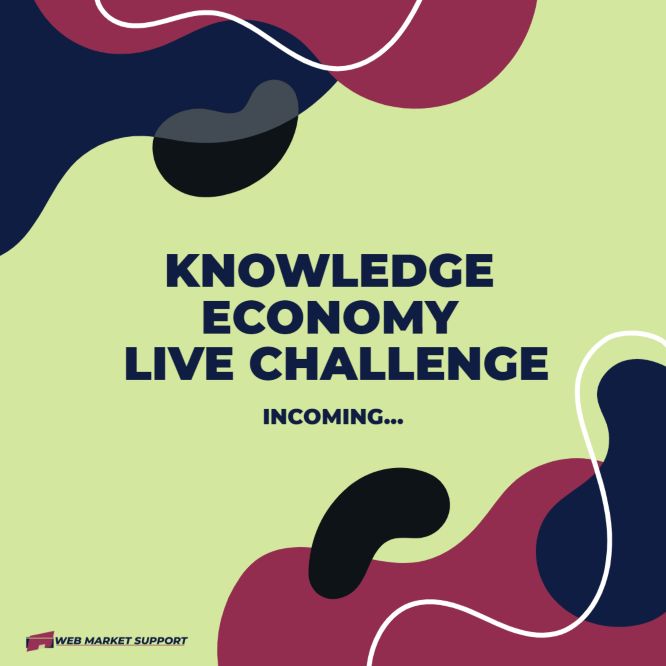
The self-education industry also known as knowledge, or eLearning, or information industry is an emerging industry and I’ve been part of it for many years, since 2015. A great feeling and an adventurous journey!
This is the industry that really changed the course of my online career and in which I had the privilege to help dozens of brands, leaders, influencers, icons, and small business owners as a marketing consultant and partner.
I and thousands of forecasters predict that this industry will surpass other bigger industries – and not just in terms of revenue or number of customers.
Is this a bold statement?
More of a reality.
And here’s what I think is the main reason:
Shift in people’s learning preferences as Universities and Colleges got left behind.
Students don’t want to be in debt. For many decades, we’ve seen millions of students go broke. Universities and Colleges cost a fortune and what you learn there are not always things you can apply immediately in business and life.
On top of that, knowledge acquired from these sources can become obsolete as things change faster than ever before. Society is changing, technology evolves, and technically nothing stays the same.
Let’s dive deep into this wonderful industry and let me show you how you can become an unstoppable “information” entrepreneur sharing knowledge, skills, expertise, and experiences, and reporting on other people’s skills and knowledge.
Knowledge Industry Success Blueprint
Workshops, Events & Happenings (Tasos & Partners)
Trailer
Quick Navigation
- Self-Education is Becoming the New Norm: Robert Kiyosaki, My journey till Feb 2020, My journey (2020 – now), Statistics
- My First Digital Sale
- Knowledge Broker: Definition, Opportunities & Options
- Growth Factors
- Challenges
- Future Trends
- Strategies for Standing Out
- #1 Competitive Advantage
- Workshop #0: Introduction
- Workshop #1: Examples Galore
- Workshop #2: Competitive Advantage
- Workshop #3: Market Testing
- Stay tuned!
Self-Education is Becoming the New Norm (Feb 2020)
In an article I wrote back in February 2020, I mentioned that the self-education industry is becoming the new norm. Now, it is the new norm. I was right.
Robert Kiyosaki Is On Fire
In an interview with Dr. Patrick Gentempo and Robert Kiyosaki, Robert revealed that he quickly discovered that we are taught to get a degree, get a job, and work for money for the rest of our lives. But this was a road he would not follow by any means.
Robert believes that the “educational” system is responsible for the rise of socialism, communism, and fascism, and even anger against the rich. It happens because they don’t teach us about money at school.
My Journey till February 2020
I received amazing knowledge during my university times. The Business Administration curriculum was extraordinary.
I learned how to manage, organize, and scale businesses, production, economics, sociology, mathematics, accounting, English, and of course, marketing.
This is when I first came across these beautiful sciences.
There was a problem though.
It was all plain theory, no implementation, no action.
There was knowledge – but not so much of a vision – professors did not really intrigue us into following our dreams, nor did they feel passionate about their positions as educators, of course, this comes with exceptions. There were professors you would not want to miss at all.
Without vision and action, it’s a dead game.
Here’s the thing.
Universities and colleges are designed to propel people to become employees of big companies and corporations.
Not a big vision, at least for me, that is why the question mark.
And this is when the action takes place; when you become an employee.
This is not necessarily a bad thing. You can have an amazing job that gives you financial freedom and you can climb up the ladder and become a manager, director, and so on.
But being an entrepreneur is who new world, you get creative and adventurous, and you get to change people’s lives, that’s something you need to experience in order to fully understand it.
There’s a Japanese proverb…
Action without vision is a nightmare. Vision without action is a daydream.
I used the proverb in reverse order for a reason.
As we can see, vision and action should work together, in unison, the one feeds the other. A well-equipped entrepreneur is one that has the vision but also takes immediate action. An unstoppable entrepreneur is also someone who believes in things before they even see them.
But you see I had the vision long before I entered the higher-education levels.
It was infused in me by my parents, both entrepreneurs and partners for life, many of their friends, and other relatives.
And when I was in the University this vision grew with me.
I had the chance to follow my dream from day one. I was studying and working a few hours at my family’s manufacturing company and when I graduated, my parents retired and I became the boss.
However, the majority of my colleagues did not have the capital needed to build their own business back in the ’90s.
There was no internet back then, and opening just a brick-and-mortar store would cost a lot of money.
So the vast majority of students were trapped in the system.
Get a degree, get a job, and work for the rest of your life for others.
This was not my dream.
When I expanded online back in December 2014, I’ve entered the self-education world without even knowing it.
I enrolled in training programs, I took independent courses, I’ve watched countless webinars, presentations, educational and how-to videos, and I’ve been to seminars.
I’ve read 1000’s of blogs and articles and created 100’s of blogs myself.
I’ve subscribed to giant publications and followed industry leaders and experts.
I’ve read and studied emails and newsletters.
I’ve participated in forums, communities, and networks. I’ve discussed this with other entrepreneurs, marketers, and partners.
I’ve read books like a maniac.
I’ve attended masterminds.
And still do, this is part of my everyday life.
In the last 5 years, I’ve learned way more than I did when I was at the University of Business Administration. 10x more, or even 50x or 100x.
Why?
Universities are teaching important topics but without having an implementation plan. There’s no action. Without practice, you can’t forward in business, that’s for sure.
I’ve been at the top of the news and I watched technology change. I was an early adopter.
I’ve studied and continue to study anything related to business, marketing and advertising, sales, web design, human psychology, etc…
I’ve acquired new skills that are necessary to fuel my business.
I was able to transform a simple marketing blog into an agency and for the first time 1 and a half years ago, I’ve got a client in the local market.
My Journey (2020 – now)
I kept on learning new things from other experts non-stop because this is a one-way road. If you stop learning, then your business starts dying.
I kept on helping amazing brands in the knowledge industry that were offering top training programs, events, and masterminds.
In the summer of 2021, I decided to do something I was not even expecting, and damn, I was not prepared at all.
This is when the idea for a brand-new methodology was born.A methodology specifically designed for small business owners and startups.
An innovative project that I stated working on since mid-2022. First, with a private group of a few beta testers and then, perfecting and improving it up until today.
The “7 IDEALS” methodology is ready to be released to the public, what is left are a few details and a documentary.
Impressive Statistics
It’s no secret that the training landscape has changed dramatically over the past ten years as eLearning and mobile technologies have gone from early-adopter novelties to mainstream essentials.
In 2011, 77% of American Corporations were using online learning (in 1995 this number was only 4%)
The eLearning market is now more than 13 years old (the word “e-learning” was coined in 1998).
Self-study e-learning (asynchronous) is on the rise now accounting for 15 % of all training delivered.
%
American corporations using online learning in 2011
How old is the eLearning market in years
%
Self-study eLearning percentage in the market
According to Forbes, E-Learning is the future. Market research firm Global Industry Analysts projected “E Learning” would reach $107 Billion in 2015 and it did. Now, Research and Markets forecasts show triple the revenue of 2015 – e-learning will grow to $325 Billion by 2025.
That’s nearly $1 billion a day.
eLearning market's revenue by 2025 in billions of dollars
And here are more data and facts:
- Giant companies like Google, Costco, WholeFoods, Starbucks, or Apple don’t ask for degrees or credentials.
- The rise of platforms like Udemy, Skillshare, Coursera, CreativeLive, or Teachable where you can learn from others any topic, any subject, any profession, in detail.
- The rise of training programs like those included in our ELITE list. Programs created by industry leaders like Eben Pagan, Steve Olsher, Kevin Harrington, Jeff Walker, Dean Graziosi, and Tony Robbins, and so many more.
My First Digital Sale
Article written in July 2022.
And today I’ll be sharing the story of my first digital sale:
And first I want to give you some context, discuss a little bit my background, and how it all started so you can better understand my excitement and what this first digital sale actually means for someone making it.
And my first digital sale happened in 2015 but let’s go back a little bit in time, 2008 when we had the European sanctions against my country.
It was an illegal move by the EU and the state issued government bonds to save the banks, and we the people played the role of guarantor, and although we guaranteed this money, the loans people had were not written off, so it was the same story, us, the people saving the banks, saving the politicians, saving the country and being enslaved once again, with a debt that was illegal, and it was FIAT money, it was fake.
And…everything changed. I watched businesses closing down, it was a very challenging period for a few years, and so I started looking for other things at that time.
I was a hotel owner and still, I am, but things really changed and so I started researching, and in 2014, in the fall, I started researching online for other opportunities and I came across a very beautiful business model.
And before I discuss this amazing business model that got me started online, I want to show you how many different business opportunities existed back then, in 2014,.
And this period was very intense, I was reading blogs and articles, I was visiting websites, subscribing to newsletters, discussing with people on forums, communities, networks, everywhere to find something attractive and I did not want to invest big in buying stuff, I wanted to invest in time, and find something that was low-entry…
and so I came across eCommerce. And it was a very lucrative business model, there were many people having success with Amazon and other digital marketplaces, but it sounded too complicated, I did not want to buy inventory and having to store things before I could sell…
and I came across dropshipping, where you could bypass this problem of buying inventory, you could partner with wholesalers to get them to ship products to your customers, but again, it sounded too complicated, I wanted something more flexible…
and I came across investing programs: there was an ocean of investing opportunities. Like HYIPs, high-yield investment programs, and all of these companies were fraudulent…
and I came across forex and binary options, and PTCs and GPTs, and exchanging links, and other business opportunities, and nothing concrete, nothing solid, and I came across revshare companies, again, most of them were fraudulent, and so I kept on researching…
And at some point, I started searching for a specific company called “Amway”. Amway is an American MLM company producing a wide range of physical products and I was once a distributor for them, maybe 1, 2 years tops, when I was a teenager, and that time I was at the university, and our family’s manufacturing company, and I was searching for other opportunities and I came across Amway, I was approached by another distributor, he recruited me and one colleague that I had from the high-school, and it was very tough, very difficult to climb up the ladder in an MLM company.
And MLM stands for multi-level marketing, multiple levels of recruitment, and here’s the thing:
Most of MLM companies are not legitimate, they base the majority of their sales on their members instead of retail sales, and that’s a big problem but Amway was one company that stood the test of time, and at that point, I wanted to check if this company was still active, and there were many years passes since I stopped working for them, and I came across an article that was discussing Amway and comparing Amway to another business model called “affiliate marketing”.
And that grabbed my attention because I wanted to get involved with a business model related to marketing, because I learned marketing at the university, and I had experience with MLM, but I wanted something different.
Something better because with MLMs companies, those that make most of the money, these are the owners, and their friends may be, and whoever got in the company early.
And Amway was maybe 20 years in business when I entered their pyramid, so it was very difficult for me to recruit people and earn some commissions and the author of the article was comparing multi-level marketing with affiliate marketing and it grabbed my attention and so I started searching more in this direction.
And affiliate marketing sounded like a very promising business model back then, compared to the other business models, and it was low-entry, you could start with only a website or a blog, or just a podcast, or video channel, or some people start with just a social media account, and here’s how it works:
You are promoting products and services from other companies that exist in the market, in exchange for commissions.
You are not getting paid for advertising these products and these companies but you have the chance to earn high commissions, big commissions.
Commissions can range from 10% to 20, 30, 40, 50, 60, 70%, or even more in some cases with digital products and membership subscriptions, it depends on the company you’re cooperating with.
You only have to be selective and choose trustworthy partners, because you are making recommendations, you are helping people with their decisions, and you only have to bring traffic to your website or your blog, your podcast, your video channel, and send this traffic to your partners so they can convert those visitors.
And you don’t have to worry about customer service, or after sales, or any service at all, you are just sending traffic and you earn commissions, and it’s a very lucrative model because you can expand your business, you can partner up with more and more companies as you progress, there is no limit on how much you can make.
So, I decided to dive deeper into this business model, and after a while, I came across an amazing community dedicated to affiliate marketing called “Wealthy Affiliate”.
And this community helped me get started with this business model, so I decided to get a domain name and in December 2014, I believe on December 28 of 2014 I bought the domain name WebMarketSupport to get started with a blog, a marketing blog reviewing companies and business models that came my way during my research, and my ultimate goal at that time was to transform this marketing blog into an agency in the future.
That’s why I chose this domain name, supporting the market of the web. And so I bought this amazing domain name, WebMarketSupport, with the intention to build a marketing blog, and the ultimate goal was to transform this blog into a marketing agency in the future.
And blogging seemed the most attractive and easiest method for me compared to other methods like podcasts or videos, and so I started with this website.
And the community of Wealthy Affiliate helped me with their amazing training, and they also have a platform where you can build websites using WordPress, and so the first thing I had to learn was building websites using WordPress and so I took courses on web development, web design, and coding like HTML, CSS, Javascript, I was learning everything I could, to get started, to understand how websites work, and what to do with traffic, people and visitors, how to manage and run this website…
and then I started learning everything I can about affiliate marketing. And Wealthy Affiliate has the most comprehensive training in the world about this industry, they cover everything you need and I took all the courses and completed all the training that existed back then, now they have added tons of training throughout the years, and I was learning affiliate marketing, I took courses on SEO, search engine optimization, optimizing your website for the search engines and for people, and I took courses on traffic acquisition and copywriting, and social media marketing, email marketing, paid advertising.
And I was learning and blogging, reviewing business opportunities, and I was helping people avoid fraudulent companies and connecting them with legitimate ones.
And after one-two months, the blog started getting some traffic, people passing by, and they were leaving comments, they were discussing with me…
and…we’ve come to the point…after 2-3 months, when I was learning everything about online marketing like a maniac and I was blogging…there it was, it happened, my first digital sale, my first significant digital sale…
because I was making some money with other revshare companies and other gambling stuff, nothing serious, nothing solid, just in the beginning to cover my expenses at Wealthy Affiliate community, the minimal expenses, it was $47 per month? now, I’m still a member, now I’m paying $29 per month I think, so I wanted to cover these expenses, and so I got involved with revshare companies and other gambling stuff, and after 2-3 months, my first digital sale happened.
And I could not be more excited, I still remember this day, and it proved to me that what I was doing was working.
And it was an exceptional feeling, and actually this sale it was not just 1 sale, this was a membership subscription, and so I earned recurring revenue, the person that took this subscription, he signed up for a whole year, so it was like a 12-month, 12-part sale, and this person renewed this yearly subscription for 4 years in a row, so it was like a sale that we can count it as 48 sales.
It was amazing!
It was proof that what I was doing was working, and so I kept on blogging, I keep on bringing traffic, and the traffic grew, so my website was getting some traction and attention there, I was doing something.
And after this sale, after this amazing event, sales started happening more often, and I was able to earn recurring revenue in some cases when you earn recurring revenue, this can add up really quickly, and when you are cooperating with more companies, you’re adding more income streams, this is when your business started to take off, and this is when you really expand and scale your business.
But the most amazing thing about affiliate marketing, about this business model, was that it helped me enter an amazing industry, the knowledge industry, the self-education industry.
And affiliate marketing was my entry point, my passport if you will to enter this amazing industry, the knowledge industry.
It’s the industry where we are getting educated by other people and then we are educating others with this knowledge. We are transferring knowledge, we get knowledge, we receive knowledge, and then we pass this knowledge to other people.
And I’ll be showing you in the next days, all my sources of knowledge, all the people that I learned from, so you can better understand how this works.
And this was just the story of my first digital sale, but we’ll dive deeper into this industry, the knowledge industry, the self-education industry, and I’ll be sharing with you case studies and examples so you can better understand the potential and the beauty, the awesomeness of this industry.
You have to do with people, you are helping people, and you are serving them at the highest level possible, this is the industry that I am so proud of being a member of since 2014.
And I entered this industry without even knowing it but I’ll be revealing more information in my next videos…
Knowledge Broker: Definition, Opportunities & Options
First of all, a knowledge broker is an entrepreneur and as such he builds and runs businesses, but an entrepreneur is not just about running businesses.
An entrepreneur is a risk-taker, an innovator, a creative soul. He creates products and services, discovers and capitalizes on opportunities.
He’s experimenting, is a lifelong learner, and problem solver.
He’s a leader, an action taker, and a hard worker among other things.
A knowledge broker is using mainly information to create products and services that can be sold in the marketplace. Information products are very popular and people are always looking for new products to fulfill their ever-changing needs.
And although there’s a huge amount of free information online, still, people are looking for speed, they need organized and specialized information about specific topics and subjects from sources they can trust. Also, this free information is found on millions of websites scattered. It’s not organized.
And there’s another problem. Not all information online is legit, and there are thousands of information producers that misdirect people.
People want to solve problems, overcome obstacles and challenges, and to improve their lives and businesses.
This is where a knowledge broker comes in, to help people find what they’re looking for.

Knowledge Extractor
A knowledge broker can extract his own knowledge, skills, and expertise to create products and services. He doesn’t have to be an expert on a field, but someone who is 2-3 steps above their target audience.
Alternatively, a knowledge broker can use life experiences as his vehicle to organize and create information products and services.
A knowledge broker can turn bad experiences, tough situations, and mess into a message. A message that attracts like-minded people who want to learn from someone that has been through what they deal with today.
Knowledge Reporter
A knowledge broker can report on other people’s knowledge, skills, and expertise to create products and services.
A knowledge reporter collects valuable information from trusted sources to organize and transform this knowledge into products and services.
He can also become a partner with other experts or other knowledge extractors or reporters as a part of a joint-venture.
Knowledge Carrier
He organizes, transforms, and delivers specialized knowledge in the form of products and services. He’s a carrier, a transporter of knowledge and information.
An information carrier is an entrepreneur that explores and identifies “hot” market segments where people’s needs are not fully met. He creates information products to fulfill these needs.
An information carrier is an expert or soon-to-be expert with a unique voice and a loyal fan base.
Knowledge Promoter
A knowledge broker can also promote information products and services from other experts, brands, or individuals they trust.
Who Can Become A Knowledge Broker
- Anyone with a message
- Anyone with experience in a field
- People with skills, knowledge, and expertise
- People that want to share their life experiences to help others move forward
- People with a passion
- People with a following
- Anyone that wants to collect, organize, transform, and deliver information
- Anyone that wants to promote information products and services from other people, experts, and brands
- Marketers
- Coaches
- Authors
- Speakers
- Practitioners
- Small business owners
- Solopreneurs
- Influencers
- Experts
A Tremendous Opportunity
We are in the middle of a big problem right now. But the biggest breakthroughs in life are when a big problem is solved.
For example…no one knew it was a problem standing on the side of the road holding your hand up in the rain, trying to get a taxi, until Uber came along and transformed the industry.
It’s the same here. The education system is broken. That’s a huge problem. We hope it repairs but it’s not right now. Everyone knows that Universities and colleges are going down.
The famous management guru, Peter Drucker, in 1997 predicted…
Universities won’t survive. the future is outside the traditional campus, outside the traditional classroom. Distance learning is coming on fast.
Universities provide generalized knowledge when in fact, people are looking for specialized knowledge.
Tell me about it. Here’s my university story.
More Reasons:
Right now, Millenials have $1.5 trillion worth of debt.
The knowledge industry is a $129 billion industry.
$4,108 spent every second, $246,000 spent every minute, $14M spent every hour, $355M spent every day.
Types Of Products And Services
There are hundreds of opportunities and different products to be made and thousands of niches, markets, and problems to be solved.
- eBooks, physical books, audiobooks
- Webinars, seminars, presentations
- Workshops online or in-person
- Videos
- Podcasts and audios
- Multimedia
- Art & crafts
- Reports
- Paid newsletters
- Online courses and training
- Website memberships
- Coaching services (online or in-person, or even group sessions)
- Consulting
- Speaking
- Live events
- Masterminds
- and much much more
Related: The Beginner’s Guide to Making Money Online (Freelancer/VA, eCommerce, Arts & Multimedia, Designer, Vlogging, PTC-GPT-Surveys, Build a Website, Affiliate Marketing, Public Speaking, Launching Products Like a Pro).
What Else A Knowledge Broker Needs To Be Successful?
It’s important to have the mindset of an entrepreneur and specific leadership skills.
If you are on a hunt for money and only that, then I have bad news for you. You might enjoy a few sales but only temporarily.
However, if you have a big vision for something higher than just making money, you are on the right path.
A knowledge broker needs to be motivated, inspired to take action, and lead others.
He needs marketing skills (as with every business) to perform market and competition research, to identify “hot” market segments and untapped opportunities, spot and track his ideal clients, and attract them. To organize product launches, to create anticipation, and to be able to convert his leads into paying customers.
He needs an advertising budget or knowledge to reach his ideal clients effectively with the least amount of time and money.
Experience in sales can be proved extremely valuable as well to overcome objections, follow up with leads, and close deals.
He also needs a strong online presence even if he only plans to work offline.
Today, the exponential growth in this industry led to impressive statistics and success stories, but it also led to fierce competition.
As a result, the modern knowledge broker needs to find ways to stand out and succeed in oversaturated markets.
The only solution is entering a market with certain characteristics (7ID Market Essentials), identifying an ideal zone for market penetration, and eventually, innovating and delivering memorable experiences by educating and entertaining our clients all at the same time.
Growth Factors
The knowledge industry, encompassing self-education, eLearning, and the broader information industry, is indeed experiencing significant growth. This expansion is driven by several key factors:
Technological Advancements:
- Internet Accessibility: Increased access to high-speed internet globally has made eLearning more accessible.
- Mobile Technology: The proliferation of smartphones and tablets allows people to learn anywhere and anytime.
- Innovative Platforms: Development of sophisticated eLearning platforms, such as Coursera, Udemy, Khan Academy, and edX, provide a wide range of courses from top universities and institutions.
Shift in Learning Preferences:
- Lifelong Learning: There is a growing recognition of the need for continuous learning and skill development throughout one’s career.
- Flexible Learning: Online courses offer flexibility, allowing learners to study at their own pace and on their own schedule, which is particularly appealing to working professionals.
Economic and Workforce Trends:
- Skill Gaps: As industries evolve, there is an increasing demand for workers with specialized skills, prompting individuals to seek additional education.
- Cost-Effectiveness: Online education is often more affordable than traditional education, making it an attractive option for many.
Impact of the COVID-19 Pandemic:
- Remote Learning Boom: The pandemic accelerated the adoption of online learning as educational institutions and businesses shifted to remote models.
- Increased Acceptance: There is now greater acceptance and recognition of online degrees and certifications by employers.
Corporate Training and Development:
- Employee Upskilling: Companies are investing in eLearning platforms to upskill their employees efficiently.
- Custom Training Programs: Many organizations are developing bespoke eLearning programs tailored to their specific needs.
Global Reach:
- International Access: eLearning breaks geographical barriers, enabling learners from around the world to access quality education.
- Diverse Offerings: The availability of courses in multiple languages and covering a wide range of subjects caters to a global audience.
Statistics and Market Trends:
- Market Growth: The global eLearning market is projected to grow from $250.8 billion in 2020 to $457.8 billion by 2026, at a CAGR of 10.3% .
- User Base Expansion: The number of users enrolling in online courses continues to rise, with millions of new learners joining various platforms annually.
The knowledge industry is poised for continued growth as technological advancements, changing educational paradigms, and evolving workforce needs drive demand for flexible and accessible learning solutions. This trend is expected to persist, further transforming how education and training are delivered worldwide.
Challenges
Small business owners in the knowledge industry face a variety of challenges:
High Competition:
- Market Saturation: With the rise of online education and digital content, the market has become crowded with many players offering similar services.
- Brand Recognition and Differentiation: Standing out in a crowded market requires unique value propositions, innovative approaches, and strong brand building.
Rapid Technological Changes:
- Technology Integration: Staying updated with the latest technological advancements and integrating them effectively into their business can be daunting.
- Learning Curve: Continuously learning new tools, platforms, and software requires time and resources, which can be a strain for small business owners.
High-Quality Content and Relevance:
- Content Development: Producing valuable, engaging, and up-to-date high-quality content consistently is essential but can be resource-intensive.
- Expertise and Relevance: Ensuring that the content is accurate and remains relevant to current trends and industry needs requires ongoing research, adjustments, and often expertise in the subject matter, which can be challenging to develop or hire.
Monetization:
- Pricing Strategies: Finding the right pricing model for courses, subscriptions, or consulting services can be difficult.
- Sustainable Revenue Streams: Creating multiple revenue streams (e.g. courses, coaching, one-time purchases, masterminds, and memberships) that are sustainable and scalable can be a tough challenge.
Marketing and Visibility:
- Effective Marketing: Developing and executing effective marketing strategies to attract and retain customers is crucial and often requires expertise in digital marketing.
- Digital Marketing Skills: Investing in SEO, content marketing, social media, email marketing, and other strategies is essential for organic growth but requires consistent effort and knowledge.
- Visibility: Reaching the target audience and maintaining their interest is a continuous challenge.
Customer Engagement and Retention:
- Engagement Strategies: Keeping customers engaged over time with new and relevant content, interactive features, and community-building efforts is another challenge.
- Retention: High churn rates can be a problem if customers do not find continuous value in the offerings.
- Providing Support: Offering timely and effective customer support to handle inquiries, technical issues, and feedback.
- Resource Management: Balancing the need for customer support with available resources and staff.
Time Management and Scalability:
- Balancing Responsibilities: Small business owners often wear many hats, juggling between content creation, marketing, customer service, and administrative tasks.
- Scaling: As the business grows, scaling operations while maintaining quality and personal touch becomes a significant challenge.
- Technology Infrastructure: Ensuring the technology infrastructure can handle growth, especially for online platforms and learning management systems.
Financial Management:
- Budget Constraints: Limited financial resources can restrict the ability to invest in quality content production, marketing, and technological tools.
- Cash flow management: Ensuring a steady cash flow, especially in the early stages, can be challenging without proper financial planning and management.
Legal and Compliance Issues:
- Content Theft: Protecting intellectual property and preventing unauthorized use or distribution of content can be challenging.
- Legal Issues: Navigating copyright laws and ensuring compliance can be complex.
- Data Privacy: Ensuring the privacy and security of customer data, especially with increasing regulations, requires robust systems and processes.
- Trust: Building and maintaining customer trust through transparent and secure data handling practices is another not to be overlooked problem.
Navigating these challenges requires a strategic approach, continuous learning, and adaptability. Small business owners in the knowledge industry need to leverage their unique strengths, seek out professonal development opportunities, and build strong networks to thrive in this dynamic field.
Future Trends
The knowledge industry is evolving rapidly, driven by technological advancements, changing consumer preferences, and new educational methodologies. Here are some key future trends in the knowledge industry:
Personalized Learning:
- Adaptive Learning Technologies: Platforms that use AI to tailor educational content to individual learners’ needs, preferences, and pace.
- Custom Learning Paths: Courses and programs that allow learners to choose their own paths based on their goals and interests.
Microlearning:
- Bite-Sized Content: Short, focused learning modules that are easy to consume and fit into busy schedules.
- On-Demand Learning: Accessing learning materials anytime and anywhere, often through mobile devices.
Gamification and Interactive Learning:
- Game-Based Learning: Integrating game mechanics into educational content to increase engagement and motivation.
- Interactive Simulations: Using simulations to provide hands-on, practical experience in a virtual environment.
Virtual and Augmented Reality (VR/AR):
- Immersive Learning Experiences: Utilizing VR and AR to create immersive learning environments, enhancing understanding and retention.
- Practical Applications: Training for real-world scenarios through virtual simulations, such as medical procedures or technical skills.
Artificial Intelligence and Machine Learning:
- AI Tutors and Chatbots: Providing instant support and feedback to learners through AI-driven tutors and chatbots.
- Data-Driven Insights: Using machine learning to analyze learning data and improve content, predict learner outcomes, and personalize experiences.
Blockchain for Credentialing:
- Secure Credentials: Using blockchain technology to issue, verify, and share educational credentials securely.
- Digital Badges: Recognizing and showcasing skills and achievements through verifiable digital badges.
Social Learning and Collaboration:
- Community Building: Platforms that foster peer-to-peer learning and collaboration through discussion forums, group projects, and social networking features.
- User-Generated Content: Encouraging learners to create and share their own content and insights, enriching the learning experience for everyone.
Lifelong Learning and Continuous Education:
- Professional Development: Emphasis on ongoing education and skill development throughout one’s career to stay competitive in the job market.
- Subscription Models: Offering access to a wide range of courses and resources through subscription-based models.
Focus on Soft Skills:
- Emotional Intelligence Training: Programs that develop interpersonal skills, communication, leadership, and emotional intelligence.
- Holistic Education: Integrating soft skills training with technical education to prepare well-rounded professionals.
Sustainability and Ethical Practices:
- Green Learning Initiatives: Promoting sustainability through virtual classrooms and reducing the expenses of traditional educational models.
- Ethical AI: Ensuring that AI and data-driven technologies are used ethically, protecting learner privacy and promoting inclusivity.
Corporate and Industry Partnerships:
- Collaborative Programs: Partnerships between educational providers and industries to create tailored training programs that meet specific business needs.
- Work-Integrated Learning: Combining academic learning with practical work experience through internships, apprenticeships, and project-based learning.
These trends indicate a shift towards more personalized, engaging, and technology-driven learning experiences. The future of the knowledge industry lies in its ability to adapt to these trends, leveraging new technologies and methodologies to meet the evolving needs of learners and professionals.
Strategies for Standing Out
The rapid growth of the knowledge industry has indeed led to increased competition, which presents significant challenges for small business owners. However, there are several strategies small businesses can employ to stand out and succeed in this crowded market:
Niche Specialization:
- Identify a Niche: Instead of trying to cater to a broad audience, focus on a specific niche where you can establish expertise and authority.
- Tailored Content: Create highly specialized content that addresses the unique needs and interests of your niche audience.
Quality Over Quantity:
- High-Quality Content: Prioritize the creation of high-quality, engaging, and well-researched content that provides real value to learners.
- Expert Instructors: Collaborate with industry experts and thought leaders to enhance the credibility and quality of your offerings.
Personalized Learning Experiences:
- Adaptive Learning: Utilize adaptive learning technologies that personalize the learning experience based on individual learner needs and progress.
- Interactive Content: Incorporate interactive elements such as quizzes, simulations, and gamified learning to enhance engagement.
Strong Brand Identity:
- Branding: Develop a strong and unique brand identity that resonates with your target audience.
- Storytelling: Use storytelling to create a compelling brand narrative that connects with learners on an emotional level.
Effective Marketing Strategies:
- Content Marketing: Leverage content marketing through blogs, webinars, and podcasts to attract and retain your audience.
- Social Media: Utilize social media platforms to engage with your audience, share valuable content, and build a community around your brand.
- SEO: Invest in search engine optimization (SEO) to improve your visibility on search engines and attract organic traffic.
- Other channels: In the ever-evolving digital space, you need to stay in the know regarding new and upcoming marketing channels and platforms.
Customer Support and Community Building:
- Support Services: Offer excellent customer support to help learners with their queries and issues promptly.
- Community Engagement: Build and nurture a community of learners through forums, social media groups, and live Q&A sessions to foster a sense of belonging and engagement.
Partnerships and Collaborations:
- Strategic Partnerships: Form partnerships with other businesses, influencers, and educational institutions to expand your reach and credibility. That’s what I did throughout all these years.
- Guest Contributions: Invite guest instructors and speakers to contribute to your courses, bringing diverse perspectives and expertise. Here’s the page with all the WMS blog contributors.
Continuous Improvement:
- Feedback Loop: Regularly collect feedback from your learners and use it to continuously improve your content and delivery methods.
- Stay Updated: Keep up with industry trends and technological advancements to ensure your offerings remain relevant and cutting-edge.
Innovative Pricing Models:
- Flexible Pricing: Offer flexible pricing options such as subscription models, tiered pricing, and discounts for early sign-ups or bulk purchases.
- Freemium Model: Consider offering a freemium model where basic content is free, but premium features and advanced courses require payment.
Leveraging Data Analytics:
- Data-Driven Decisions: Use data analytics to understand learner behaviour, track progress, and refine your strategies based on insights.
- Personalization: Leverage data to offer personalized recommendations and learning paths to enhance the learning experience.
While the knowledge industry is highly competitive, small business owners can carve out a niche and succeed by focusing on quality, personalization, strong branding, effective marketing, and continuous improvement. By leveraging these strategies, you can differentiate yourselves from larger competitors and build a loyal customer base.
By staying agile and responsive to market demands, small businesses can find and maintain their unique position in the growing knowledge industry.
#1 Competitive Advantage
The #1 competitive advantage for newcomers in the knowledge industry is agility and innovation. Here’s why:
Speed of Implementation:
- Fast Adaptation: Newcomers can quickly adapt to changes in technology, market demands, and educational trends without the inertia that larger, more established companies might face.
- Responsive to Feedback: They can rapidly implement feedback from users to improve their offerings, enhancing customer satisfaction and loyalty.
Cutting-Edge Technologies:
- Embrace New Technologies: Newcomers can leverage the latest technologies such as artificial intelligence, machine learning, virtual reality, and augmented reality to create innovative and engaging learning experiences.
- Mobile and Microlearning: Implement mobile-first strategies and microlearning modules that cater to the modern learner’s preference for on-the-go, bite-sized learning.
Unique Value Propositions:
- Innovative Content Delivery: Develop unique and engaging ways to deliver content, such as gamified learning experiences, interactive simulations, and social learning platforms.
- Personalization: Utilize data analytics and AI to offer highly personalized learning experiences that adapt to individual learner’s needs, preferences, and progress.
Flexibility in Business Models:
- Experimentation: Newcomers can experiment with different business models, such as subscription services, freemium offerings, and pay-per-course options, to find what resonates best with their target audience.
- Agile Marketing: Implement agile marketing strategies that can be quickly adjusted based on performance metrics and market feedback.
Niche Focus:
- Specialized Offerings: Newcomers should focus on underserved niches or emerging fields where competition might be less intense, allowing them to become leaders in those specific areas.
- Community Building: Create a strong community around niche interests, fostering engagement and loyalty.
Customer-Centric Approach:
- Direct Engagement: Engage directly with customers through social media, webinars, and forums to build strong relationships and gather real-time insights.
- Customer Feedback Loop: Implement a robust feedback loop to continuously improve and innovate based on learner input.
Examples of Agility and Innovation in Action:
-
Duolingo: A language learning app that leverages gamification to enhance user engagement and retention, offering a fun and effective way to learn languages on the go.
-
MasterClass: Provides unique courses taught by world-renowned experts and celebrities, offering exclusive insights and high-quality production that differentiate it from traditional eLearning platforms.
-
Khan Academy: Focuses on personalized learning paths and a mastery-based approach, providing free, high-quality educational content accessible to anyone, anywhere.
Agility and innovation enable newcomers to the knowledge industry to quickly adapt, implement new technologies, and respond to market needs more effectively than established competitors. By staying nimble and continuously pushing the envelope, newcomers can carve out a unique space for themselves and achieve significant growth and success.
This ability to rapidly innovate and adapt to changes in the market environment gives newcomers a distinct advantage over larger, more established players who are way slower to pivot and adopt new trends.
Workshop #0: Introduction
- A short introduction to this wonderful industry
- The growth during the last 7+ years
- The main benefits of selling “information”
- The BIG #1 problem in this industry
- The solution
- What we are going to cover in this series of workshops, events, and happenings.
Workshop #1: Examples Galore
Back to the most valuable asset in our times… Information.
In this workshop I layout a galore of examples that are part of the knowledge industry. An army of information products and services that I created throughout the years.
There’s a hidden bonus inside the workshop.
Workshop #2: Competitive Advantage
Welcome back to the knowledge industry series of workshops, events, and happenings.
Today, we are diving deeper to discover:
- Growth Factors
- Challenges
- Future Trends
- Strategies for Standing Out
- #1 Competitive Advantage
Get prepared for the next and most critical workshop. We’ll be developing information products and services from scratch.
Workshop #3: Market Testing
Market testing is an important component of marketing and the base for innovation.
Here’s what we cover:
- Why Market Testing?
- Innovation through “7 IDEALS”
- A New Client – A New Market – A New Challenge
- Vision – Goals – Strategy – Action Plan
- A New Information Product
- Ongoing Updates/Reporting
- secret section
We discuss various models and frameworks of the “7 IDEALS” methodology:
- Market Parallax (consumer behaviour research and analysis – target audience, market segmentation, targeting, market positioning, and testing
- X-Mark (industry and competition research)
- 7ID BMCF (custom business models)
- Marketing Mix (the marketing choices to satisfy the needs of the target market)
- 7ID Multi-Test Protocol (testing wildcard)
There’s a hidden bonus for attendees.
Stay Tuned!
The knowledge industry is experiencing unprecedented growth, fueled by rapid technological advancements, the increasing demand for continuous education, and the shift towards digital and remote learning. As a dynamic and expansive field, it encompasses eLearning, self-education platforms, business coaching, and information product creation, among others. This growth presents abundant opportunities for small business owners and startups, but it also brings significant challenges due to heightened competition and rapidly changing market conditions.
For newcomers and small business owners, standing out in this crowded market can be daunting. The high competition means that simply offering quality content is no longer sufficient. To overcome these challenges, businesses must focus on agility and innovation as their primary competitive advantages. By staying flexible and responsive to market trends, and by continuously innovating their offerings, small businesses can carve out a niche for themselves. This involves embracing new technologies, experimenting with interactive and personalized learning experiences, and constantly updating content to keep it relevant and engaging.
One of the key strategies to differentiate in the knowledge industry is to integrate entertainment and a personal touch into educational offerings. Today’s learners seek more than just information; they want engaging, interactive, and enjoyable learning experiences. Small business owners should leverage gamification, virtual and augmented reality, and social learning platforms to make learning more immersive and captivating. Additionally, building a strong community around their brand can foster loyalty and create a supportive network for learners, enhancing the overall learning experience.
Moreover, small business owners should focus on building strong, sustainable revenue models and ensuring high-quality customer support. This includes exploring various monetization strategies such as subscription models, tiered pricing, and offering exclusive content or bonuses to loyal customers. Providing exceptional customer support is also crucial, as it builds trust and encourages repeat business. Utilizing data analytics to track performance and customer feedback can help refine and improve offerings continuously.
In conclusion, while the knowledge industry presents significant challenges, small business owners can achieve success by prioritizing agility and innovation. By staying ahead of technological trends, creating engaging and personalized content, and fostering strong community connections, they can not only survive but thrive in this competitive marketplace. With a clear focus on these strategies, small businesses can turn challenges into opportunities and build a resilient, successful presence in the knowledge economy.
We’re going to cover every aspect of this business model in detail in the upcoming days. Workshops, case studies, live events, and various happenings by me and my partners.
This page serves as the hub for this industry and it will be continuously updated, everyday, so bookmark it and come back for more.
Don’t let this huge opportunity slip by.

Tasos Perte Tzortzis
Business Organisation & Administration, Marketing Consultant, Creator of the "7 Ideals" Methodology
Although doing traditional business offline since 1992, I fell in love with online marketing in late 2014 and have helped hundreds of brands sell more of their products and services. Founder of WebMarketSupport, Muvimag, Summer Dream.
Reading, arts, science, chess, coffee, tea, swimming, Audi, and family comes first.
Some of the links on this page are “sponsored”. For more information, I refer you to the Disclaimer page.



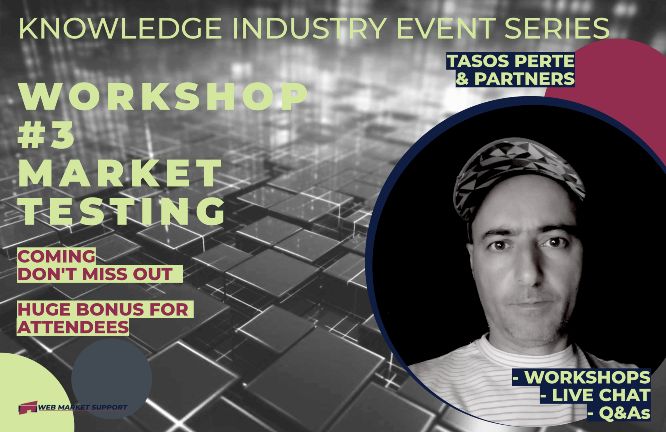
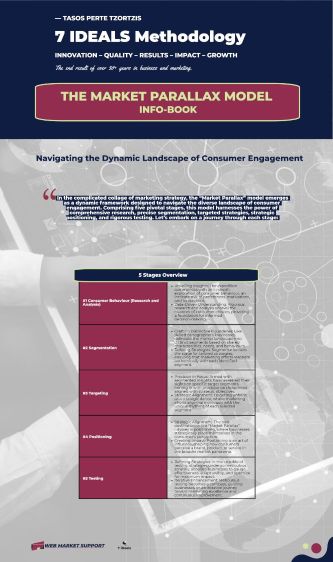
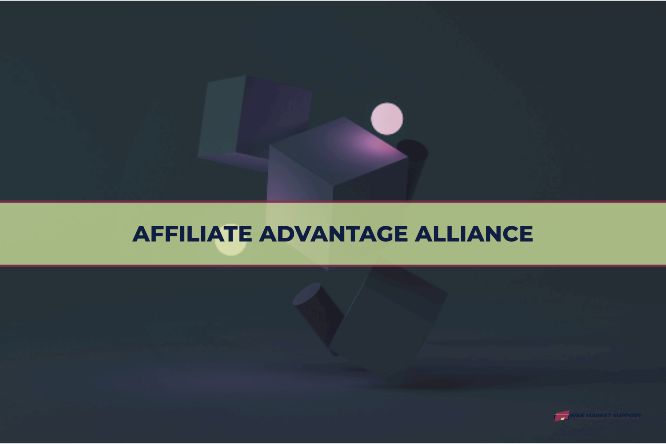
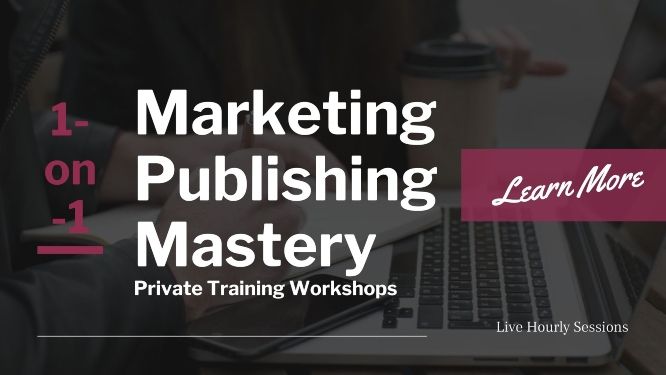
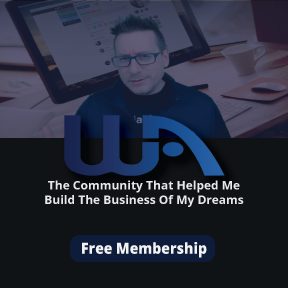




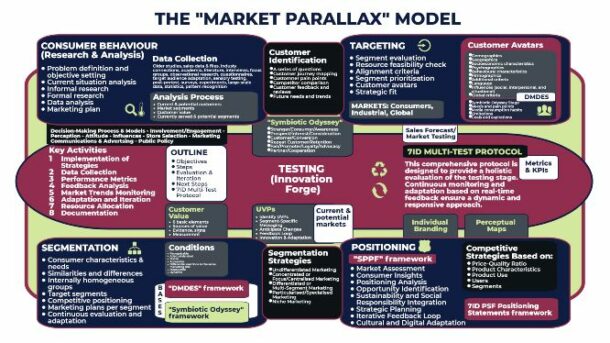
0 Comments